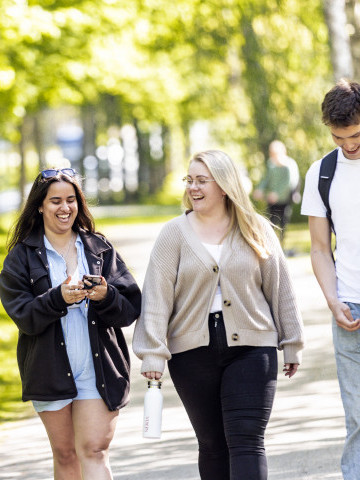
Bachelor and Master Degree Programmes
Bachelor Degree Programmes
Bioeconomy
Technology and Seafaring
- Bachelor of Maritime Management, Maritime Management, Captain, daytime studies, Turku.
- Bachelor of Maritime Management, Maritime Management, Captain, blended studies, Turku.
- Bachelor of Engineering, Maritime Technology, daytime studies, Turku.
- Bachelor of Engineering, Maritime Technology, blended studies, Turku.
- Bachelor of Engineering, Information Technology *, daytime studies, Vaasa.
Health and Welfare
- Bachelor of Health Care, Nursing, daytime studies, Vaasa
- Bachelor of Beauty and Cosmetics, Beauty Care, daytime studies, Vaasa
- Bachelor of Health Care, Biomedical Laboratory Science, Vaasa
Arts and Humanities
-
Bachelor of Culture and Arts, Fine Arts *, Pietarsaari
- Bachelor of Culture and Arts, Game arts, daytime studies, Pietarsaari
Master Degree Programmes
Business
- Master of Business Administration, MBA, Digital Business and Management, full or part time, Vaasa
- Master of Business Administration, MBA, Sustainable Business Design, full or part time, Turku
Bioeconomy
Technology and Seafaring
- Master of Engineering, Intelligent Systems, part time studies, Vaasa
- Master of Engineering, Autonomous Shipping Management, part time studies, Turku
- Master of Engineering, Industrial Management and Engineering, part time studies, Vaasa
- Master of Engineering/Master of Maritime Management, Maritime Management, part time studies, Turku
- Master of Engineering, Structural Engineering, part time studies, Raasepori
Health and Welfare
Arts and Humanities
* - Eligibility criteria: 120 ECTS of previous university level studies.
Scholarships and Tuition Fees
The studies are free for EU citizens.
Tuition fee-paying (non EU/EEA) students can apply for a scholarship. Read more about tuition fees and scholarships on the Admissions Services pages.
Daytime or blended studies for Bachelor's Degree
Full or part time studies for Master's Degree
You can complete your degree either by studying daytime/full-time or blended/part-time. Daytime/full-time studies are usually arranged on weekdays at 8 am-5 pm. Contact teaching is combined with online teaching, group and project work, independent work and internship periods. Blended/part-time studies make it possible to combine work with studies. There is less contact teaching compared to full-time studies. Depending on the degree programme, contact teaching is arranged during the day, in the evening, during the weekend or as intensive periods.
Do you want to study in Swedish?
Interested in exchange studies at Novia?
Active Student Life at Novia UAS
Novium is the Student Union for all students at Novia UAS. Novium trains Tutors and takes care of student advocacy at both national and local levels. Novium appoints student representatives for internal and external cooperation bodies, as well as guarding student rights and working towards fair treatment.
Student Associations at Novia UAS
Student associations are located on each campus and their task is to arrange activities and help create a pleasant study experience and overall atmosphere for their students. Many of the associations have their own, expedient spaces and organise activities, such as sitsfest (sitzer in Swedish; sitsit in Finnish), excursions, and exercise events. You can find a list of the different Student Associations on the Novium Student Union website.